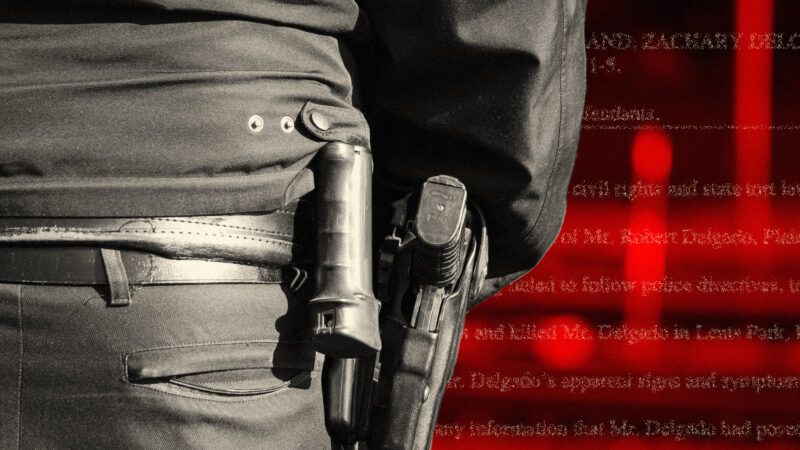Lawsuit Claims Portland Police Shot Unarmed Homeless Man, Then Ate Pizza While His Body Lay on the Ground
Robert Delgado's family is now seeking damages.

Two years ago, Portland police shot and killed an unarmed homeless man named Robert Delgado while he was having a mental health crisis in a city park. Now his family is suing, claiming that the actions of Portland police that day and the department's policies violated Delgado's Fourth Amendment rights.
On April 16, 2021, Portland Police received a call to the department's non-emergency number about a homeless man aiming an orange-tipped BB gun at a fence. The caller said the man wasn't aiming the BB gun at any people but "wielding it at the fence." The caller indicated that the homeless man "thinks he's some kind of cowboy…or James Bond."
Zachary DeLong, a Portland Police officer on the Enhanced Crisis Intervention Team (ECIT), responded to the call. According to the complaint, it appears that DeLong was told that Delgado had a gun, though he wasn't seen threatening anyone with it. The complaint also states that when DeLong arrived at the park, he did not see Delgado holding a gun.
The Portland Police Department's ECIT, according to the city's website, "features specially trained and vetted police officers who respond to persons in behavioral health crisis and seek to safely de-escalate situations." But Delgado's family alleges that DeLong did exactly the opposite.
According to the lawsuit, DeLong arrived at the park and saw Delgado shirtless standing alone near his tent encampment; his "hands were empty, and Defendant DeLong did not see a gun." Nevertheless, DeLong immediately retrieved his AR-15 from his car and shouted at Delgado, who responded by "pacing and yelling."
The lawsuit claims that Delgado's hands were empty when DeLong confronted him and that "Defendant DeLong knew or should have known that there was a substantial probability that Mr. Delgado was experiencing houselessness and suffering from serious emotional or mental distress. Per PPB policy, as outlined above, Defendant DeLong had to consider these factors before using force."
Instead of attempting to diffuse the situation, DeLong and a second officer took cover behind two trees "90 feet away" from Delgado, trained their weapons on him, and began shouting "conflicting commands." According to the complaint, these commands suggest that DeLong believed Delgado to be unarmed. "DeLong began yelling commands that showed that he did not believe that Mr. Delgado was holding a gun when approached, such as 'If you reach for a gun, I'm going to fucking shoot you!' and 'Get your ass on the ground!'" The complaint further states that Delgado responded to these commands by shouting "get the fuck away from me" and "just fucking shoot me."
According to the lawsuit, Delgado walked over to his tent a few moments later and picked something up. As he was beginning to stand up, DeLong fired two shots with his Colt AR-15 rifle, one of which struck Delgado in the torso; the second officer, Samantha Wuthrich, fired a single non-lethal round from a 40 mm launcher. DeLong's round would eventually kill Delgado, who bled to death within minutes after the bullet tore through his "spleen, stomach, the left side of his diaphragm, and the lower lobe of the left lung."
DeLong and Wuthrich failed to provide aid after firing on Delgado. The lawsuit claims that "Approximately 5 minutes and 45 seconds" after being shot by DeLong, Delgado was shot again by "Officer Smith," who fired another round from the 40 mm launcher as Delgado lay in the grass, not moving.
Officers finally began to render aid to Delgado seven minutes after DeLong shot him. "By that point," the complaint reads, "Mr. Delgado had stopped moving, had no pulse, and was not breathing. Attempts at CPR and medical aid were not successful."
The complaint also alleges that "as Mr. Delgado's body lay in the park after being killed, a large number of Portland Police officers feasted on pizza nearby in plain view of the public."
Delgado's family is now seeking a jury trial and damages. They seek to prove in court that DeLong violated Delgado's Fourth Amendment rights and that his conduct reflects a pattern and practice of behavior in the Portland Police Department that is a direct result of the city's failure to "train, discipline, and supervise its officers, including Defendant DeLong, in encountering people with mental illness and deescalating situations to avoid the use of force."
Put simply, DeLong had "available alternatives. He used none." Now Portland should pay up.


Show Comments (85)